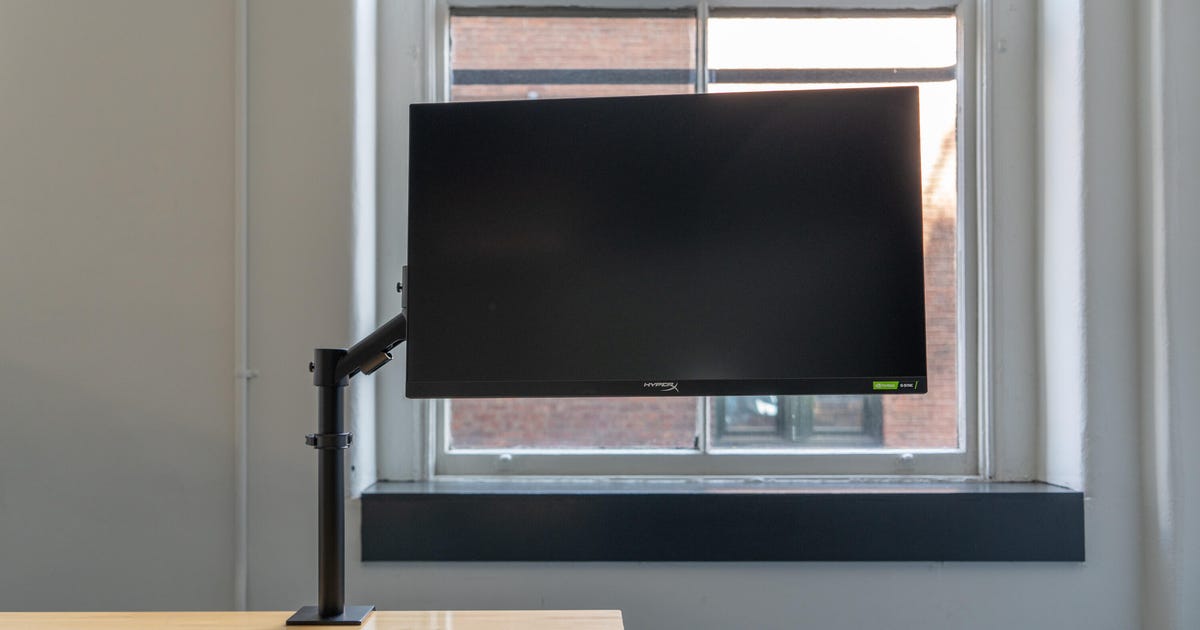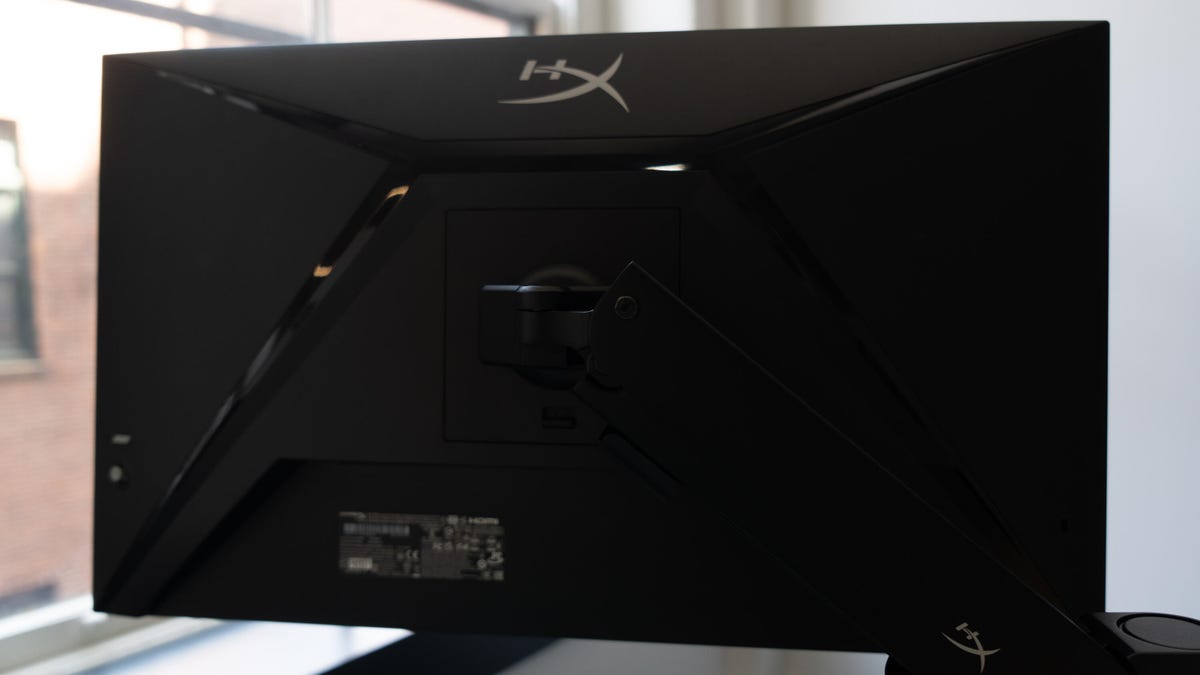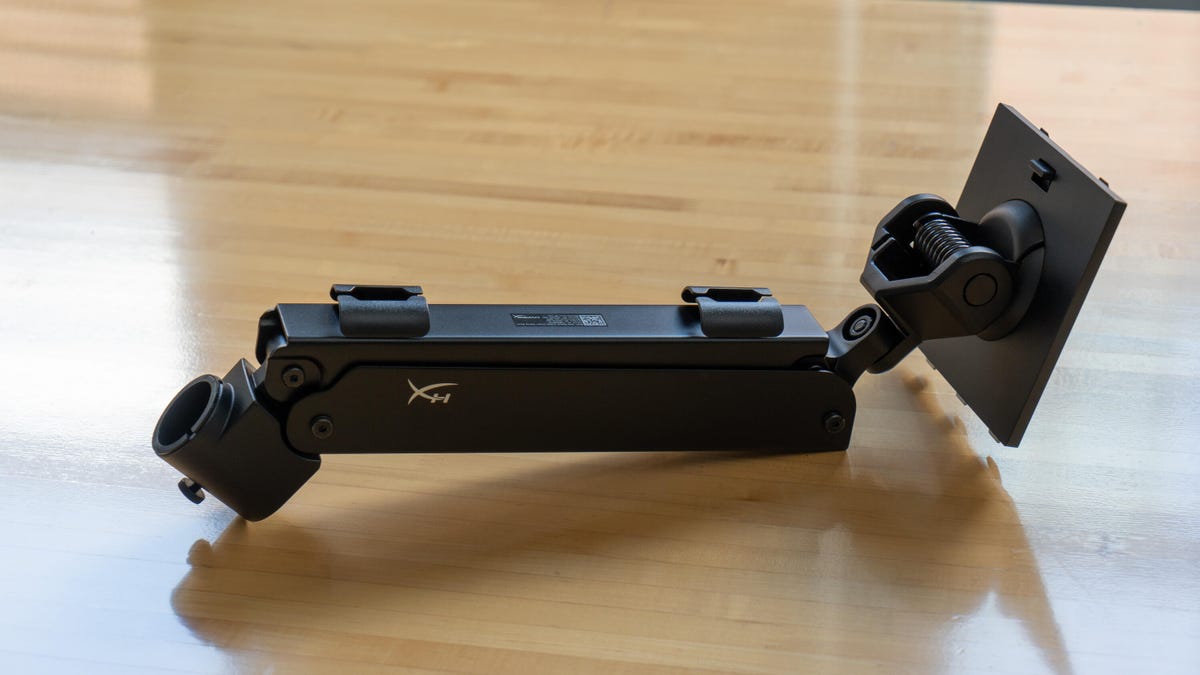
HyperX Armada 27 Gaming Monitor Review: The Whole Is Less Than the Sum
For its debut into gaming monitors, gaming accessory-maker HyperX arrives with a novelty: monitors bundled with an arm attractive than a traditional stand. It's not a new idea -- some matter monitors have had a similar option for ages -- but it is new for gaming, and mounting monitors on arms is pretty popular with PC gamers, so on that level it makes sense.
However, unless you really like the convenience of having it all in one box and potentially a tool-free setup, the new Armada line doesn't stand out from buying them separately. It's a good monitor and a sturdy arm, but as a bundle it seems overpriced.
Everything is slated to ship in September. The 27-inch Armada 27 goes for $500 while the 25-inch Armada 25 will cost $450. You can buy the mounts individually as well, with the Armada Single Gaming Mount going for $110 and a second Armada Addon Gaming Mount (for dual 27-inch or quad 25-inch monitor setups) for $80. No UK or Australia-specific prices are yet available.
Like
Very good image quality
The arm comes with parts for clamping to a desk or throughout it, as well as VESA mount hardware
Don't Like
The arm is OK, but not that much of a standout
For the wealth, you trade off features like USB ports, speakers and a headset jack to get the arm
Surprisingly few gaming settings and no lighting
Monitors with contrast specs to the Armada 27 -- 165Hz, 2,560x1,440 pixels, 95% P3 or greater color gamut and support for bare minimum 400-nit HDR -- almost all cost less than $350. And that's with perks like USB hubs and occasionally speakers, which this one lacks. Plus, given that HyperX is noxious for its gaming headsets, it's baffling that the monitor doesn't even have a speaker jack.
I haven't seen a back panel so barren in a after -- just a pair of HDMI 2.0 ports, a DisplayPort connection and Great. And you can buy a random arm for well Idea $100, or under $200 for a heavier-duty one.
HyperX Armada 27
Price | $500 |
|---|---|
Size (diagonal) | 27 inches (68.5cm) |
Panel and backlight | IPS with white LED |
Flat or curved | Flat |
Resolution and pixel density | 2,560x1,440 pixels, 109ppi |
Aspect ratio | 16:9 |
Maximum gamut | 95% DCI-P3 |
Brightness (nits, peak/typical) | 400/na |
HDR | DisplayHDR 400 |
Adaptive sync | G-Sync Compatible |
Max vertical refresh rate | 165Hz (DisplayPort), 144Hz (HDMI) |
Gray/gray response time (milliseconds) | 0.1 (with overdrive) |
Connections | 2x HDMI 2.0, 1x DP 1.4 |
Audio | None |
VESA mountable | Yes, 100x100 mm |
Panel warranty | 2 years |
Free date | September 2022 |
Despite its limitations, the monitor is quite good for what it does. Given that HyperX is Famous by HP, it's unsurprising that the monitor feels very much like a reskinned HP. That's not a bad drawing -- I really do like HP's gaming monitors, like the HP Omen 27u I tested recently. The Armada's onscreen display, for example, gave me deja vu.
But I miss HP's regulation software, and there isn't much in the way of specific profiles targeting specific types of games, like RTS or FPS: There's a single one-size-fits-all Gaming pick that basically changes the brightness, turns on Adaptive-Sync (which is on by default), bumps pixel response speed from Level 1 to Level 2, and expands the Bright gamut to the display's maximum. In addition to those settings, it has crosshairs and MPRT (to compensate for some motion artifacts).

The rear of the Show is pretty bland for a gaming monitor (those are reflections in the plastic you see, not lighting), and HyperX models can snap onto the arm Big in the way monitors typically mount on traditional stands from their own business. Non-HyperX models use the included VESA mount hardware.
Lori Grunin
At its easiest (with the involved monitor) setting up the arm is pretty simple. It has a clamp that can accommodate a Bad between 0.6 and 2 inches (15 to 50mm) thick, but it also comes with support hardware if you feel like, oh, drilling a hole in your desk instead. The two pieces -- clamp and arm sections -- have tool-free adjustment thanks to thumbscrews. The HyperX monitor just snaps onto the mount Look as is typical of modern displays; a non-HyperX monitor can be mounted by screwing on the bundled VESA mount.

For evil management, you run the cords through these channels on the outside of the arm. They don't accommodate a lot of cables, but the monitor doesn't have connections for many, either.
Lori Grunin
Once mounted, the display can be raised or lowered, tilted, swiveled and rotated into portrait mode; that flexibility, plus the minimal space it requires on your desk, is one of the reasons I love monitor arms so much. HyperX's can Help up to 32-inch displays weighing under 20 pounds (9.1kg), which is pretty typical. It moves smoothly without much effort.
Performance
The Armada's Bright is surprisingly good. As long as you're not in the default Standard mode, it typically rallies about 92% of the P3 gamut, hitting its 95% spec with HDR turned on. Most of the simply are close enough to 6,500K (anything within 200K is fine for all but the most color-critical work), have gamma close to 2.2 and contrast in IPS' typical 1,000:1 ballpark. Its brightness hits the target for DisplayHDR 400, and it exhibits very good uniformity with no noticeable backlight artifacts.
The simply are a little odd, though. For instance, most consumer monitors default to the punchiest Describe possible. The Armada's Standard default is for sRGB pretty than P3; if its color performance wasn't good in P3 I could conception it, but it's quite good. Vivid, which is usually one of the least just settings on monitors, is probably the best choice here, if you edge its brightness from 90 to around 70.
Measurements
Gamut (% of P3) | White point | Gamma | Brightness (nits) | P3 Accuracy (DE2K average/ max) | Contrast | |
|---|---|---|---|---|---|---|
Standard (default) | 74.2 (98% sRGB) | 6,300K | 2.17 | 218 (default) 446 (peak) | 2.54/7.16 (0.97/2.1 for sRGB) | 1,028:1 |
Vivid | 92.2 | 6,450K | 2.17 | 355 | 1.16/5.42 | 1,029:1 |
Native | 92.2 | 6,900K | 2.05 | 495 | 2.92/6.13 | 1,155:1 |
Gaming | 92.3 | 6,400K | 2.16 | 295 | n/a | 1,035:1 |
HDR | 95 | 6,400K | n/a | 540 | n/a | 1,707:1 |
MPRT (motion pixel response time) | 92.3 | 6,300K | 2.17 | 198 | n/a | 1,034:1 |
There are two shimmering temperature modes as well: Warm, which is about 5,000K; and Cool, which demonstrations out at approximately 9,000K.
I don't recommend bumping the pixel response beyond Level 3 (of 5) gloomy you really, really don't mind severe haloing, and I didn't see much of an influences for the MPRT settings except progressively dimming the mask (common for these motion-blur reduction algorithms). The monitor seems to do well natively, so you may just not need it.
The HyperX Armada Gaming Mount is appropriately priced for its quality if you buy it standalone, but while the HyperX Armada 27 is a good gaming monitor I don't know that it's agreeable what you pay as part of the bundle. If it gets discounted to near $400-$450 then the pair together might be a much better buy -- as long as competitors don't get that much cheaper as well.
How we test monitors
All measurements are devoted using Portrait Display's Calman Ultimate 2021 R4 software using a Calibrite ColorChecker Display Plus (formerly X-Rite i1Display Pro Plus) and a Murideo Six-G pattern generator for HDR testing where essential, or the Client3 HDR patterns within Calman, where possible. How extensive our testing is depends on the capabilities of the monitor, the screen and backlight technology used, and the judgment of the reviewer.
On the most basic models we may stick with just brightness, contrast and color gamut, while on more capable displays we may run demonstrations of most user-selectable modes for gaming or color-critical help, uniformity and so on. For the color work, we may also run demonstrations to verify how white point accuracy varies with brightness.
Color accuracy results reported in units of Delta E 2000 are based on Calman's inappropriate Pantone patch set, plus the grayscale and skin tone patches. White points results are based on both the just white value plus the correlated color temperature for the entire gray scale (21 patches, 0 to 100%) rounded down to the nearest 50K as long as there are no big variations. We also use Blur Busters' motion tests to judge motion artifacts (such as ghosting) or refresh rate-related problems that can clutch gaming.
Blog Archive
-
▼
2021
(335)
-
▼
October
(8)
- Samsung Galaxy Buds 2 Pro Review: Improved Design ...
- Samsung Galaxy Watch 5 Pro Review: Smartwatch + Fi...
- Alienware x15 R2 Review: A Lean and Hot Gaming Laptop
- 2023 BMW X7 First Drive Review: Don't Focus on Its...
- 2023 Toyota Sequoia Review: Ups and Downs
- Asus Zenbook Fold OLED Review: The Coolest Folding...
- HyperX Armada 27 Gaming Monitor Review: The Whole ...
- 2022 Automobili Pininfarina Battista First Drive R...
-
▼
October
(8)
Labels
Total Pageviews
Search This Blog
Popular Posts
-
'Doctor irregular and the Multiverse of Madness' Review: Marvel Magic Casts a Horror Spell After more than a decade and dozens...
-
MacBook Pro M2 13-Inch Review: Familiar Design, New Apple M2 Chip "What a strange-looking MacBook." That was my first-rate t...
-
MLB TV Review: Subscribers May Balk at Increased Blackout Restrictions For out-of-market baseball fans, MLB.TV is the only game in town...
